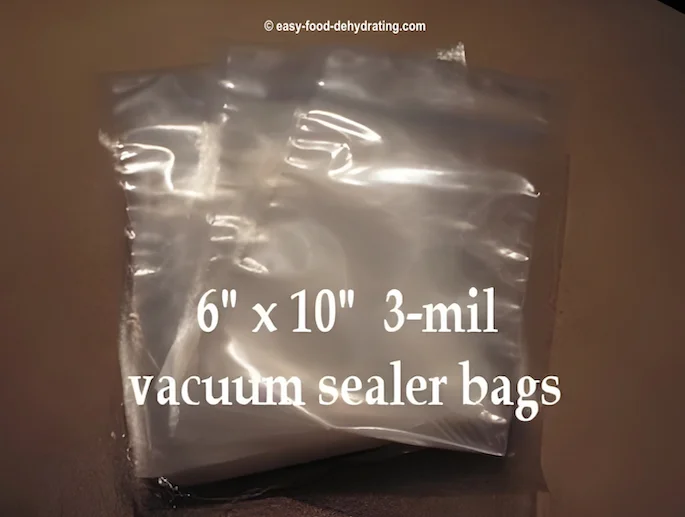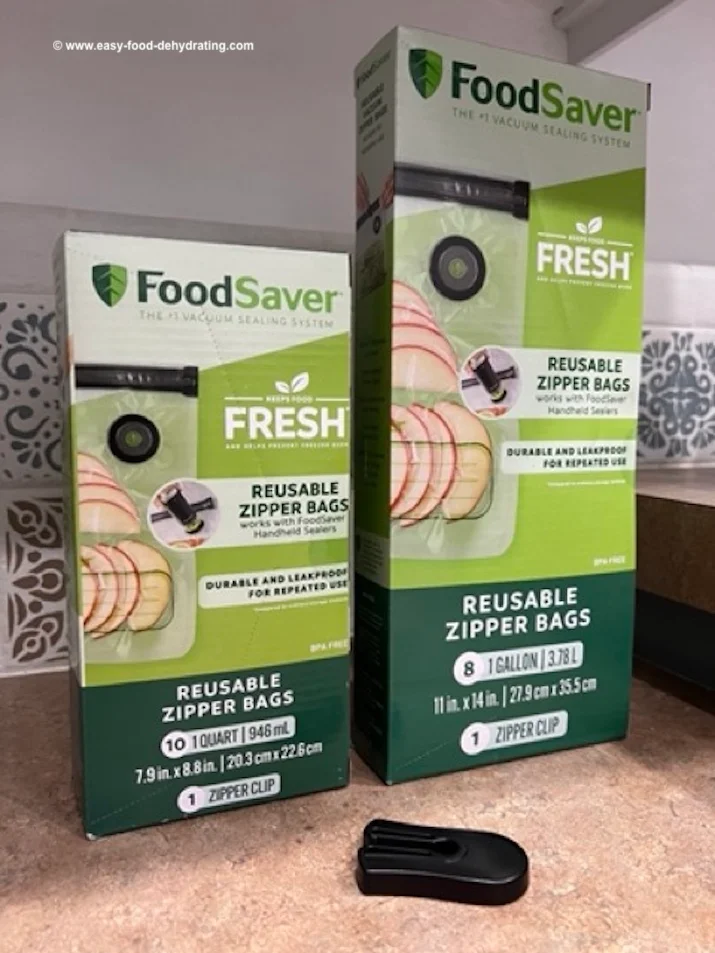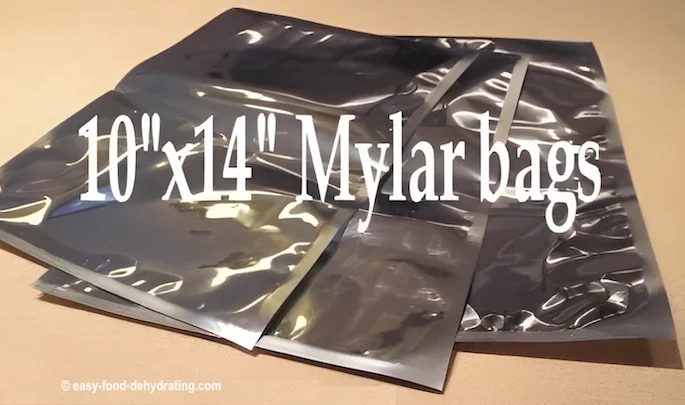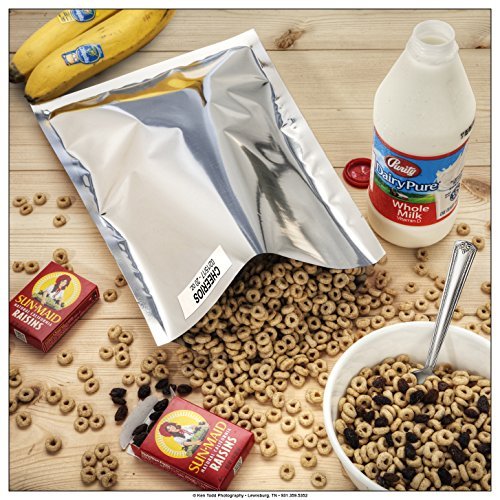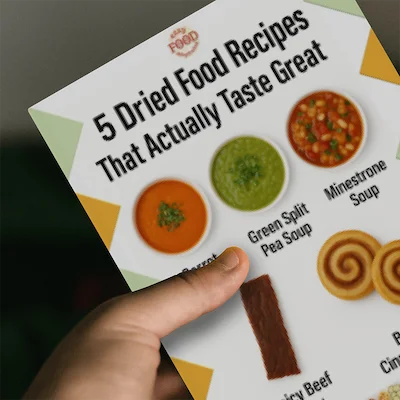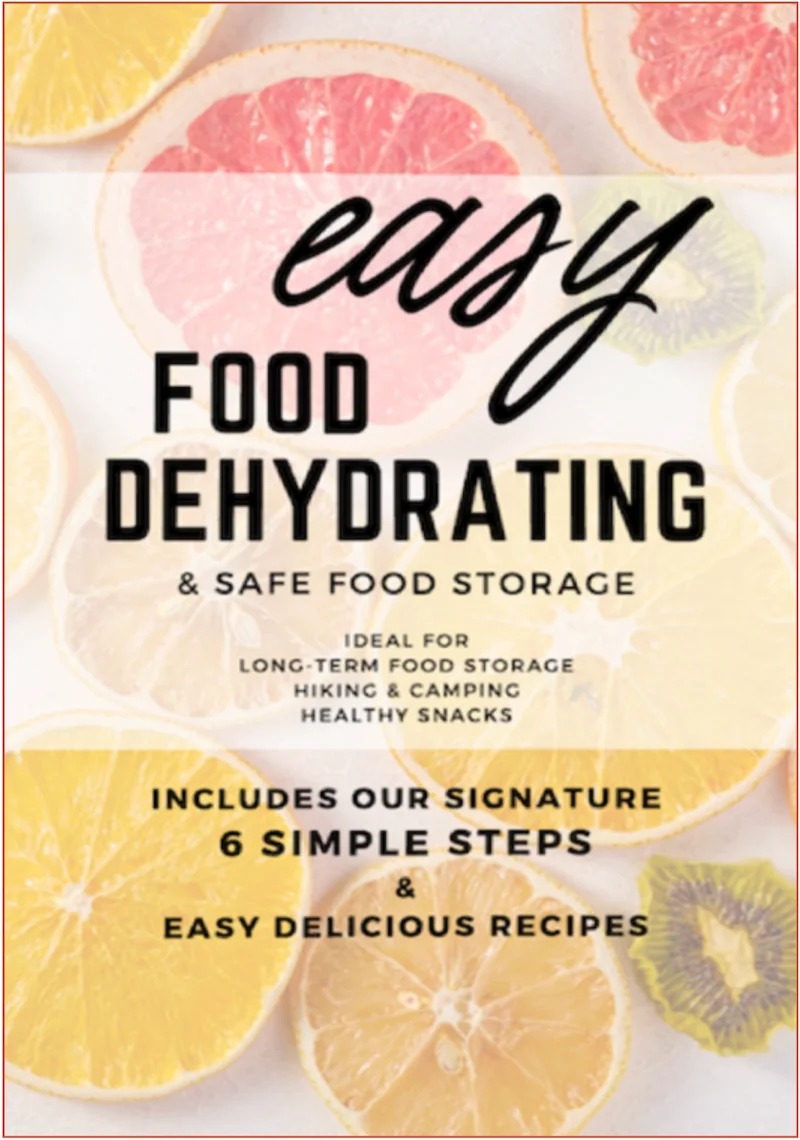What We Mean by “Dehydrate”
Here at Easy Food Dehydrating, “dehydrate” always means using an electric food dehydrator — the easy, reliable way to dry food at home.
- Home
- How to Store Dehydrated Food for Long-Term Freshness
- Food Vacuum Sealer Bags
Food Vacuum Sealer Bags 101:
Safe Storage for Your Dehydrated Foods

Food vacuum sealer bags are the unsung heroes of dehydrated food storage. The right bag thickness, texture, and size prevent punctures, lock out oxygen, and keep your hard-won batches fresh far longer—without bulky jars or the risk of stale, crumbly snacks.
✅ Quick Answer: What food vacuum sealer bags should I use for dehydrated foods?
Choose textured, BPA-free vacuum sealer bags at 3-mil minimum (4-mil for sharp or crunchy foods). Use precut pint or quart for everyday batches and rolls for odd-ball bulky-sized items. Add a 100cc oxygen absorber + desiccant per pouch, then vacuum and seal.
Whether you’re sealing jerky, fruit chips, or crumbly veggies, this guide shows exactly which bags to choose, when to use rolls vs. precut, and how to avoid the most common sealing mistakes.
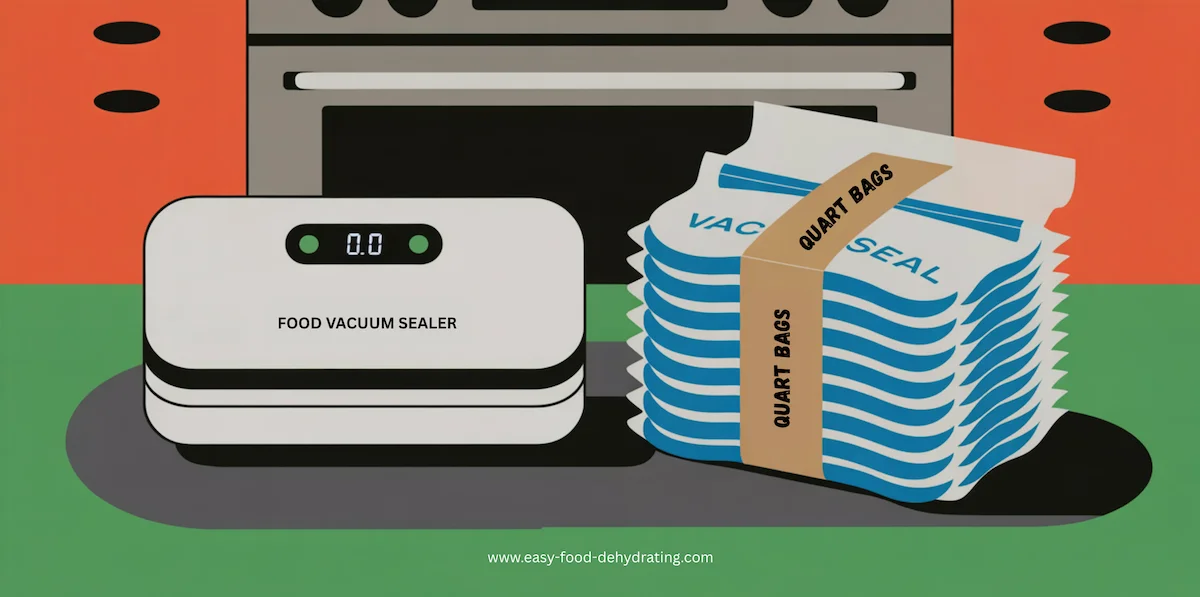
You can purchase food vacuum sealer bags in varying sizes, and thicknesses. Make sure you purchase ones that are at least 3-mil thick.
Any thinner than 3-mil ... and you may get some brittle foods puncturing your bags after the vacuuming! And we don't want that to happen.
The size of the vacuum-sealer bags I use are 6" x 10" which are PINT size bags, shown in the above image.
Recently, I've upped my game and have purchased rolls so I can make "custom-size bags."
Here are the most commonly used sizes of food vacuum-sealers and bags:
Compare Top FoodSaver Models & Starter Kits
The FoodSaver machines remove air, one of the main causes of mold and food spoilage - and they create an airtight seal to lock in freshness.
Bonsenkitchen Vacuum Sealer Machine
The Bonsenkitchen Vacuum Sealer is a powerful, low-noise machine built for high-speed, continuous use. It features a handle-locked design, built-in cutter, and comes with 2 bag rolls plus 100 vacuum bags — everything you need for easy, efficient food preservation.
Keep food fresh up to 5x longer with the FoodSaver 4800 2-in-1 Vacuum Sealer. Automatic sealing, built-in handheld sealer, and easy-clean drip tray make it perfect for everyday meals or bulk storage.
FoodSaver 8" x 20' rolls, 6-pk
FoodSaver GameSaver 8" x 20' Vacuum Seal Long Roll with BPA-Free Multilayer Construction
- Keep game and fish fresh up to 5x Longer with FoodSaver GameSaver 8-inch rolls.
- Create custom-sized bags - simply cut a piece to your desired length, seal one end, fill, and then vacuum seal.
- 8" x 20' rolls
- BPA-free
- Pack of six rolls
FoodSaver 1-Quart Food Storage Sealer bags
- Constructed of durable yet pliable material that creates an airtight barrier around foods, extending freshness and locking in flavors
-
Quickly and easily portion food
from bulk shopping or when storing leftovers.
- BPA-FREE MATERIAL: Safe for storing raw and cooked foods, it's also freezer, refrigerator, microwave, and boil-safe
- 1-quart size precut bags, 44-count
FoodSaver Pint-size Food Storage Sealer bags
- Constructed of durable yet pliable material that creates an airtight barrier around foods, extending freshness and locking in flavors
-
Quickly and easily portion food
from bulk shopping or when storing leftovers.
- BPA-FREE MATERIAL: Safe for storing raw and cooked foods, it's also freezer, refrigerator, microwave, and boil-safe
- 1-pint size precut bags, 28-count
As an Amazon Associate, I earn commission from qualifying purchases. The price you pay does not increase. Read disclosure here.
If you want to save money, try these Weston brand food vacuum sealer bags for a 100-count pack. Note that they are 3 mil thick! These are the ones I use.
2 Ply 3mm Thick, for NutriFresh, FoodSaver & Other Heat-Seal Systems, for Meal Prep and Sous Vide, BPA Free, 6" x 10" (Pint), 100 count, Clear
As an Amazon Associate, I earn commission from qualifying purchases. The price you pay does not increase. Read disclosure here.
Try FoodSaver's Reusable Vacuum-Sealer Bags, Too!
I love these bags, especially the little zipper-closing gadget you see there at the bottom of the image. I also use these FoodSaver reusable zipper bags to protect my opened bags of desiccant packets! See the reusable bags on Amazon here (Affiliate Link).
Bag Thickness Guide: 3-mil vs 4-mil—What Actually Matters
The food vacuum sealer bags are smooth on the outside but only ONE side (on the INSIDE) - has textured bumps for easy air removal.
And no, it doesn't matter which side up the bags go on the vacuum sealer machine!
Make sure you select good food vacuum sealer bags for storing your dehydrated food—SAFELY! Thin bags can puncture easily.
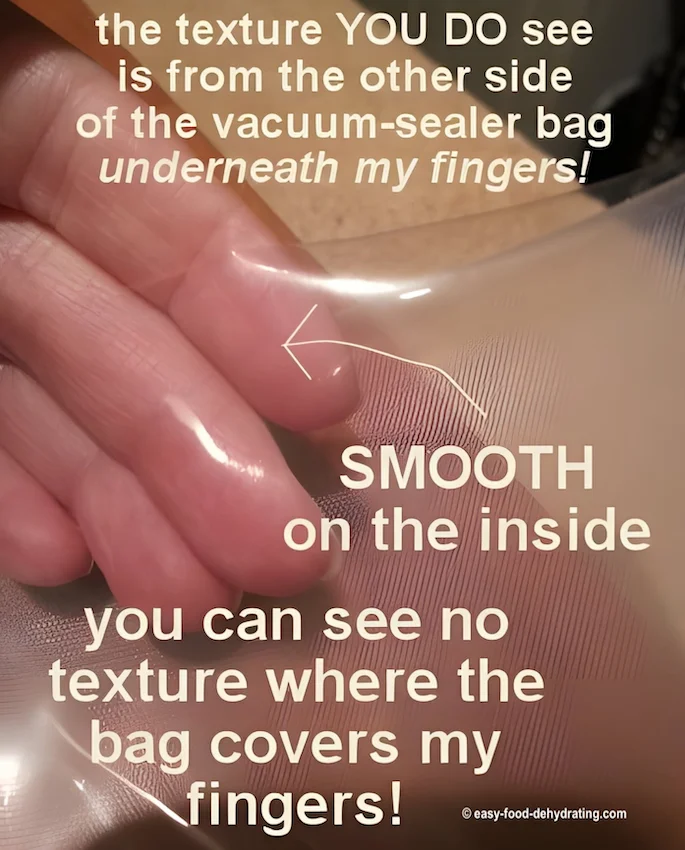 The upper part of the bag is smooth, both sides
The upper part of the bag is smooth, both sides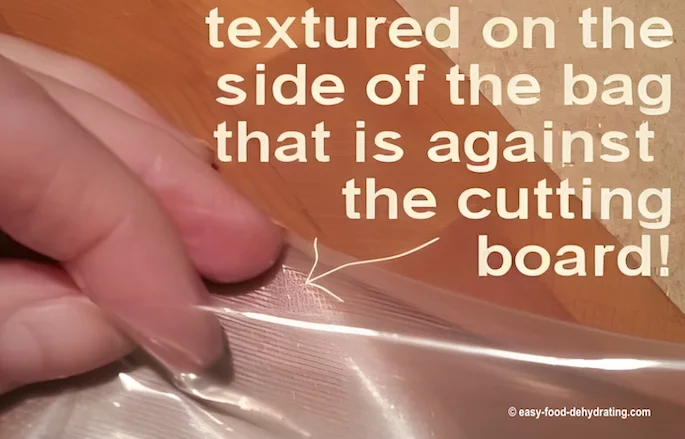 The lower part of the bag has textured bumps on the INSIDE where my middle finger is.
The lower part of the bag has textured bumps on the INSIDE where my middle finger is.Can You Vacuum-Seal Mylar? Here’s Why Not...
Mylar Bags Are Smooth... So What? Read On!
Mylar Bags Are Smooth...
So What? Read On!
This was brought to my attention by my Realtor-friend, Bev Miller, who was trying so hard to vacuum seal her Mylar bags.
She discovered it won't work because the Mylar bags' surface is SMOOTH! She's so smart!
You see because both interior sides of the Mylar bag are smooth (just like its exterior), they just clamp together tightly and you can't really draw the air out.
Food vacuum sealer bags, however, have textured bumps on one of the interior sides of the bag so you CAN draw the air out!
Best Mylar Bags for Long-Term Food Storage
Dry-Packs 1-Gallon ShieldPro Mylar Bags
- 10" x 14" Dry-Packs ShieldPro Mylar Bags
- Includes 60x 300cc Oxygen Absorbers (in packs of 20)
- 10" x 14" Genuine Mylar Bags for Long-Term Food Storage
- Pack of 50
- No oxygen absorbers included
As an Amazon Associate, I earn from qualifying purchases — this does not affect the price you pay. Read full disclosure.
PLEASE NOTE:
We don’t VACUUM the air OUT of
the Mylar bags,
but we DO use the sealing element
of the Food Sealer
machine to seal the Mylar bags.
The Mylar bags are simply containers for
two, three,
or four of our previously
vacuum-sealed packages of dehydrated food.
PLEASE NOTE:
We don’t VACUUM the air OUT
of
the Mylar bags, but we
DO use the sealing element
of the Food Sealer
machine
to seal the Mylar bags.
The Mylar bags are simply
containers for
two, three,
or four of our previously
vacuum-sealed packages
of dehydrated food.
Please read more about Mylar bags.
Why One Side Is Textured: Air-Channel 101
Simply put, we need the bumpy texture because the textured side of the food vacuum sealer bags to allow the air to be drawn out! :-) Without these tiny textured bumps, it's pretty much impossible to draw the air out.
DON'T forget to add your 100cc oxygen absorber
and 5g desiccant packet
to the bag before drawing the air out!
DON'T forget to add
your 100cc oxygen absorber
and 5g desiccant packet
to the bag before
drawing the air out!
When the bag has been vacuumed, it's still clamped tightly inside the FoodSaver machine, so don't worry about air making its way back inside the bag - after vacuuming, it then seals the bag. The addition of the oxygen absorber draws out any smidgens of 'stray' oxygen still lingering inside the bag.
A NOTE from Nancy in NC:
I get the 11-inch by 16-feet rolls and cut the material to make the size bag I want.
I order directly from foodsaver.com and get the 'GAMESAVER' rolls, individual rolls, or the 6-pack.
I asked about the thickness and was told 4-mil, then I said they ought to include that bit of information in the item description.
Right now, the bags are listed under "heavy duty". ALSO: See vacuum-sealer rolls
Without Making a MessZero-Mess Filling: The Wide-Mouth Funnel Method
- Wide Mouth Plastic Funnel
- Green
- 4.75" (12cm)
- Perfect for Canning
As an Amazon Associate, I earn commission from qualifying purchases. The price you pay does not increase. Read disclosure here.
To aid in filling of my bags, I use a canning funnel. They are inexpensive and come in very handy for filling your plastic vacuum bags or Mason jars.
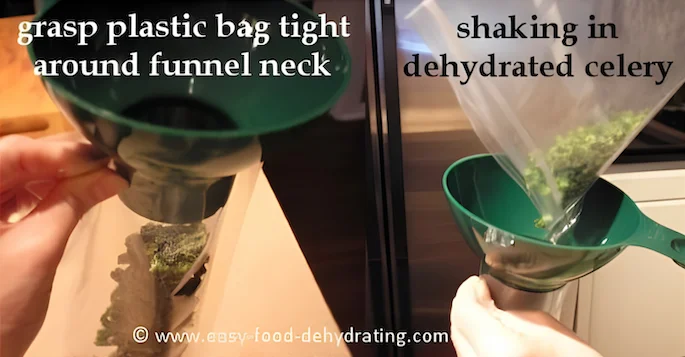
See the two side-by-side photos above. It shows how best to grasp the bag using your thumb and index finger and hold it tight around the funnel base. With a bit of practice, you'll soon get the hang of it! It makes filling your jars and bags "a breeze."
NOTE:
After vacuuming our bags, I pull out a 2ft length (approx.) of plastic wrap. I then wrap the vacuum-sealed package in it! Follow the
optional plastic wrap guide here.
Pro Tip: Reseal Snack Bags Without Crushing Chips
This note is from Paul Bee, a regular visitor to Easy Food Dehydrating. He'd written via Facebook to say that he uses his vacuum food sealer to seal up his potato chips! I had to ask how he does that without crushing the chips?!
He said "I don't actually vacuum out the air, just use the seal-function-only of the food vacuum sealer. After eating my chips, I cut the bag to just about half, eliminating as much of the air as possible. I then place the bag edge on the heat seal and seal it up! My chips will stay fresh for up to 45 days!"
Apparently, Paul is one who can contain himself around potato chips. A bag wouldn't last more than an hour around me! LOL
Handy Storage Reference Chart for Long-Term Food Safety
This chart walks you through the proper order of layering bags, absorbers, and desiccants for safe long-term storage.
| Layer | Container | What Goes Inside | O₂ Absorber | Desiccant | Seal Method | Notes |
|---|---|---|---|---|---|---|
| Primary | Vacuum-sealer bag | Dry food | 100cc | 5g | Vacuum seal | Wrap in cling film (abrasion guard) |
| Secondary | Mylar bag | 3–4 primary packs | 300cc | 20g | Heat-seal (no vacuum) | Barrier + light block; label contents & date. Text will now wrap properly instead of stretching wide. |
| Storage | Pantry/Shelf | Finished Mylar bundles | — | — | — | Cool, dark, dry; rotate oldest first |
Primary
Container: Vacuum-sealer bag
What Goes Inside: Dry food
O₂ Absorber: 100cc
Desiccant: 5g
Seal Method: Vacuum seal
Notes: Wrap in cling film (abrasion guard)
Secondary
Container: Mylar bag
What Goes Inside: 3–4 primary packs
O₂ Absorber: 300cc
Desiccant: 20g
Seal Method: Heat-seal (no vacuum)
Notes: Barrier + light block; label contents & date
Storage
Container: Pantry/Shelf
What Goes Inside: Finished Mylar bundles
Notes: Cool, dark, dry; rotate oldest first
Food Vacuum Sealer Bags — Your Top Questions, Answered
What bag thickness is best for dehydrated foods?
What bag thickness is best for dehydrated foods?
Use 3-mil minimum; choose 4-mil for sharp or crunchy items (jerky edges, chips) or if bags will be stacked.
Precut bags or rolls—how do I choose?
Precut bags or rolls—how do I choose?
Precut pint and quart bags are fast for routine batches. Rolls let you custom-fit bulky or oddly shaped foods and reduce waste.
Can I vacuum-seal Mylar bags?
Can I vacuum-seal Mylar bags?
Not really. Mylar’s smooth interiors have no air channels. Heat-seal only after placing your already-sealed pouches inside for long-term storage. Add a 300cc oxygen absorber at the bottom of the Mylar bag, and a 20g desiccant packet at the top, then seal the Mylar bag.
Do I still need oxygen absorbers?
Do I still need oxygen absorbers?
Yes—50cc per pint-sized bag, or 100cc for quart-sized food vacuum sealer bags (scale up as volume increases). They capture residual oxygen your sealer can’t pull.
Are vacuum sealer bags food-safe and reusable?
Are vacuum sealer bags food-safe and reusable?
Choose BPA-free, food-grade bags. Reuse only if they didn’t hold raw meat/dairy and the seal area remains undamaged; trim the edge and reseal.
Sous-vide/boil-safe—does that matter here?
Sous-vide/boil-safe—does that matter here?
It can. Many textured, multilayer bags are rated for simmering. Check the manufacturer rating if you plan to sous-vide or boil in-bag.
Why might my seal fail overnight?
Why might my seal fail overnight?
Common causes: crumbs/oil on the seal zone, insufficient headspace, wrinkled film, or punctures. Make sure the top 1" is clean, smooth flat by gently patting the contents prior to vacuuming, and consider 4-mil for sharp foods.
You’re set! With the right texture, thickness, and a quick oxygen-absorber habit, your dehydrated foods will taste just-made for months.
Want easy, ready-to-seal meal ideas? Grab the free 5 Dried Food Recipes You'll Actually Love PDF (below)—carrot soup, minestrone, split pea soup, spicy beef jerky, and banana cinnamon rolls are all inside.
Get 5 Dried Food Recipes You'll Actually Love
Here's where you can get your copy of our all new
5 Dried Food Recipes (That Actually Taste Great)
They're my all-time favorite easy dried food meals!
Get it here right now.
For Free!
Before You Go...
If you enjoyed this page, tap the ❤️ in the lower right-hand corner.
It saves this page to your Grow bookmarks so you can find it again later.
You’ll also see quick share buttons to copy the link, post to Facebook,
or save it straight to Pinterest.
